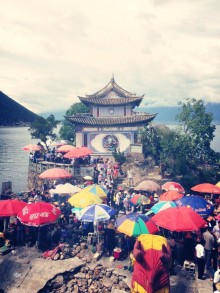If there is anything that I have learned in my time as an Asian Institute work-study student, it’s that it’s that virtually every issue can be reduced to politics. I know that this may sound like a gross exaggeration. Not to mention that, as a political science student, my bias is clear. Nonetheless, my experience this year has led me to believe that recognizing the overarching role that politics—from the local level all the way to the international—plays in our everyday life is crucial to navigating the economic, social, and environmental challenges that we continue to face.
On a related note, as we finish the first quarter of 2015 and our New Year’s resolutions already feel like the naïve result of the dreamy, sparkle-induced stupor that accompanies New Year’s festivities, it is important that we hold each other to account on a much more important resolution: to become global citizens. By “global citizens” I am not implying the necessity of any world government or a new legal “citizenship” status under international law. Rather, I am advocating the development of a collective consciousness that emphasizes that we are inhabitants of the world as a whole just as much as we are inhabitants of our particular cities, provinces, and countries. As such, we must uphold certain obligations to the global community, including remaining proactively engaged in and informed about issues, such as poverty, conflict, and injustice, that plague the global community.
By understanding the role that politics plays in these issues, and in the more mundane encounters of daily life, it becomes clear how we can develop this consciousness of global citizenship and become proactive members of our global community. To take one example, consider the role of politics and—more specifically, the role of political will—in finding a comprehensive solution to climate change and population growth.
When coupled together, the issues of climate change and population growth often implicate the rapidly industrializing and expanding countries in Asia. One on level, climate change and population growth both appear to be natural phenomena that do not bend to the will of politics. Upon closer examination, however, these issues are as intimately tied to national and international political landscapes as they are to each other. This does not merely implicate explicit environmental protection or family planning policies—such as China’s controversial one-child policy or new urbanization plan—but extends to virtually every policy decision that our political leaders make on our behalves. Considering that the world is expected to reach its carrying capacity within the next half century, and that climate scientists are issuing graver warnings about our inaction on this front, it is more important than ever to become politically engaged.
While this example is perhaps one of the more obvious ones, attending AI events has demonstrated that even the most obscure and unknown topics, from watersheds in India to farmer-crop relationships in Thailand, all must be understood against the background of political activity. Therefore, if we are to mount a serious challenge to the global issues that we are faced with, it is necessary that we resolve to become active, engaged, aware global citizens and to use our political clout to secure a healthier and safer world.
-written by Fatin Tawfig, a third year student double majoring in psychology and political science at the University of Toronto.
